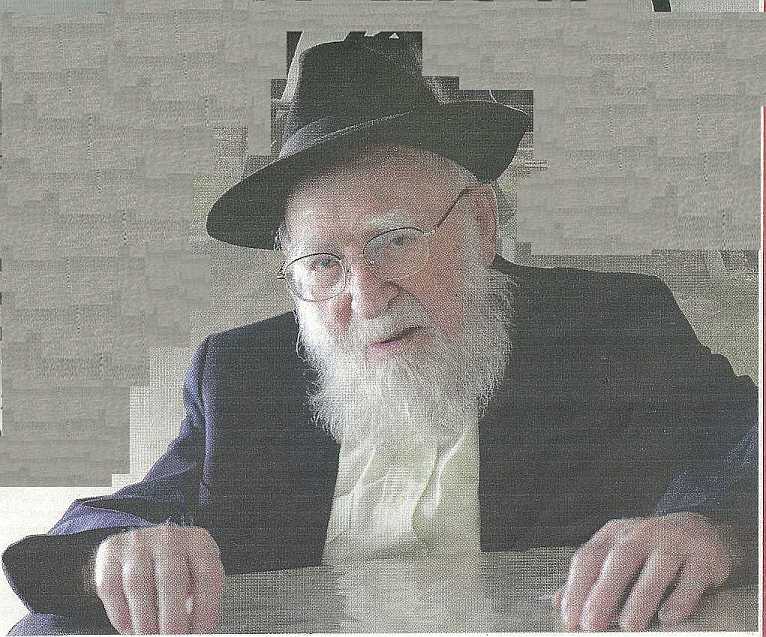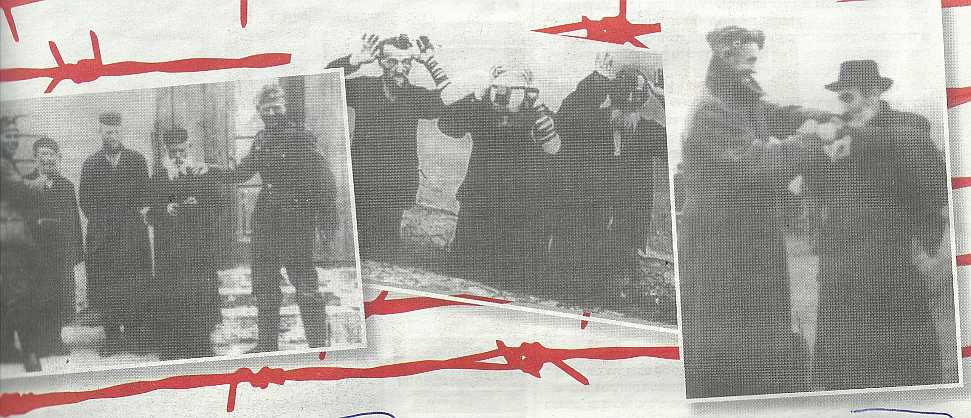R' Yehoshua Eibeschitz

From the perspective of his 102 years on this earth, Rabbi Yehoshua Eibeschitz, a Polish Holocaust survivor who lost his entire family, testifies to the participation of Polish citizens during and after the war, in persecution of Jews. His own brother was murdered after he was fingered by a Pole as a Jew.
"On the night that I was released from the camp, after the Russians came and the Germans fled, we remained, a handful of Jews still alive. When the Poles saw us, they began shouting, `There are still live Jews?! Hitler didn't finish the job!' This was the welcome which the Poles gave us!"
A melancholy air settles on Rav Yehoshua Eibeschitz, as he recalls those moments of the crumbling of the Nazi fiend. His voice trembles. Ever since he heard of the new Polish law, his soul has not been at rest. The many calamities he underwent, surviving them with heroic Jewish stamina, combine to a fiery, painful compendium of a writ of accusation against the Poles.
Rav Eibeschitz, who for many years toiled with all his might to commemorate Jewish courage during those horrendous years in a series of books which he wrote, turned this week to the editors of Yated Ne'eman requesting permission to tell the public about the Poles, the nation whose parliament has arbitrarily decided, among other things, that "whoever alludes publicly, contrary to the facts" that the Polish people or government were accomplices to Nazi war criminals, is liable to be jailed for up to three years.
After the First War, he explains, Poland rose up anew. "Before that, it had been divided into three parts, under the rule of the Prussian, Russian and the Austro-Hungarian governments. It became independent after World War One. But the Polish commander who stood at the head of the new army, staged pogroms against the Jews. Among other travesties, they used to throw Jews to their deaths out of speeding passenger trains, just like that. I grew up with such stories."
He says that there was no Jewish community between 1918 and 1939 which did not suffer several pogroms. "One particular event remains in my mind. Right after the reestablishment of Poland, four Jews in the city of Radom stood outside, reciting Kiddush Levana. A Polish neighbor saw them and reported them to the army. The authorities did not hesitate. That very night they were court-martialed and put to death. Among these was the son of the Admor of Alexander, author of `Tiferes Yisroel', HaRav Yaakov Feivel Danziger, HY"D."
He tells us that during the twenty years the state of Poland existed between the wars, there were countless laws passed against the Jews. For example, there was a big shortage of fish. The non-Jews hardly bought fish. The authorities, knowing that the Jews needed fish to eat on Shabbos, imposed astronomical taxes on fish. At a certain stage the rabbonim fought against this. Rebbe Menachem Alter, the brother of the Gerrer Rebbe, along with other rabbonim, said that no one should buy fish for Shabbos, but rather prepare gefilte fish from ground chicken.
There were many pogroms. A well-known story is the village Pashitik in the Radom region. Eight young men organized to protect the community from harm. They were arrested and tried, and later sentenced to long prison terms. Their crime was defending their community against rioters who attacked it. This was a prelude to the Holocaust.
Pictures of crimes by Polish citizens

In the Holocaust, in contrast to what they are saying now, they had a large part in the destruction of Polish Jewry through the help they gave to the Germans. On the first Yom Kippur after the outbreak of war, in 5740 (1939) they murdered five Jews in the city of Kalish. Who started this? Servants of Jews who led the Germans to their employers. Among those murdered was Moshe Flinker Hy"d, a Ger Chosid and brother of the author Dovid Flinker. They were all murdered in the city square.
On Rosh Hashanah of that year, famed educator Pessiah Shereshevsky, one of the first graduates of the Beis Yaakov of Soroh Schenirer, said that the mayor of Koznitz, an assimilated Jew, was tortured to death. She was there and saw the crime as Dr. Gunsher was murdered.
She told, "The Germans tried to force him to burn a Sefer Torah. He refused. They beat him to death and then burned him with the Sefer Torah. This story appears in Rebbitzen Shereshevsky's book, BeMachashakim.
Rav Eibeschitz says that throughout the Holocaust years, Polish citizens told the German oppressors about Jews. "The Germans were not always able to tell who was Jewish, but the Polish were. They pointed out Jews. They were very good at finding out bunkers where Jews were hiding. They also exposed Jews who were passing as goyim. They told the Germans and brought about their deaths.
His own brother Moshe was passing himself off as a non-Jew. After the war, Rav Eibeschitz was trying to track down reports that his brother was alive and he went to Lodz. He found his brother's old employer, R' Ezriel Stein, who told him that he had personally seen him murdered by the Germans.
R' Stein said that he was taken to a work camp every day. Moshe used to wait for him, passing himself off as a goy. He used to throw them parcels of food. One day a Polish citizen happened to be there and he fingered Moshe: "He's a Jew," he told the German soldiers. Moshe was arrested and after they determined that he was, in fact, a Jew, was cruelly murdered.




